|
|
|
Sort Order |
|
|
|
Items / Page
|
|
|
|
|
|
|
| Srl | Item |
| 1 |
ID:
191229
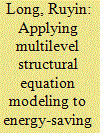

|
|
|
|
|
| Summary/Abstract |
Most studies that explain differences in energy-saving behavior focus on individual psychological influences. Yet, energy-saving behavior is likely to be nested within individual and regional contexts and shaped by multi-level interactions. Therefore, this study constructs a multilevel analysis framework of energy-saving behavior. We use multilevel structural equation modeling to examine the interaction between individual psychological factors and city contextual factors related to energy-saving behavior based on city-level statistics and surveys of residents in representative Chinese cities. The results show the following: (1) Usage-reduction behavior is mainly influenced by individual psychological factors, while energy-efficiency promotion behavior is influenced by both individual psychological and city contextual factors. Specifically, city-level factors explain 9.9% of the variance of energy-efficiency promotion behavior. (2) At the city level, environmental pollution, economic development, and public transportation penetration can positively predict energy-efficiency promotion behavior. (3) The cross-level interaction results indicate that economic development inhibits the influence of environmental pollution perceptions on environmental attitudes. These findings point to the need to consider regional contextual forces when studying environmental behavior, and they provide a scientific basis for developing targeted policies for cities at different economic development levels.
|
|
|
|
|
|
|
|
|
|
|
|
|
|
|
|
| 2 |
ID:
132602
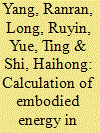

|
|
|
|
|
| Publication |
2014.
|
| Summary/Abstract |
In order to find efficient trade measures to reduce China×s energy consumption and to provide theoretical support for the climate talks between China and America, we investigate the impact of Sino-USA trade on energy consumption from the perspective of embodied energy. An Environmental Input-Output Life Cycle Assessment (EIO-LCA) model was established to calculate the total energy consumption coefficient, the direct consumption coefficient and the complete consumption coefficient of the sectors of the national economies of China and America. After taking into consideration the data of every sector of the national economy in Sino-USA trade, energy embodied in the import and export trade between China and America was calculated to verify the real energy flows in Sino-USA trade. The research results suggest the following: China is the net exporter of embodied energy in Sino-USA trade, and coal, crude oil and natural gas are the major components. In 1997-2011, the net exports of China×s embodied energy totaled 1523,082,200 t of standard coal, the amount of China×s energy consumption increased by 895,527,900 t of standard coal, and America×s energy consumption decreased by 11,871,200 t of standard coal as a result of Sino-USA trade. On this basis, corresponding policies and recommendations are proposed.
|
|
|
|
|
|
|
|
|
|
|
|
|
|
|
|
| 3 |
ID:
149937
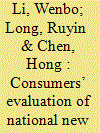

|
|
|
|
|
| Summary/Abstract |
The Chinese government has issued numerous policies to promote the development and adoption of new energy vehicles (NEVs) to address the problem of excessive energy consumption and environmental pollution. In this study we divided these policies into seven categories: macroscopic, demonstration, subsidization, preferential tax, technical support, industry management, and infrastructure. Since consumers’ opinions affect the policy choices of government, based on questionnaire data we use a four paradigm model to analyze the consumers’ evaluation of each policy in terms of perceptions of importance and satisfaction. The results show that macroscopic policies are perceived to be of high importance and satisfaction, whereas for industry management policies they are perceived to be of low importance and satisfaction. The importance perceptions of preferential tax and demonstration policies are low, whereas perceptions of their satisfaction are high. Perceptions of the importance of subsidization, technical support, and infrastructure policies are high, whereas perceptions of their satisfaction are low. We find that the subsidization, technical support, and infrastructure policies need urgent improvement. Finally, we put forward several suggestions to improve the current policies and increase the consumers’ intention to adopt NEVs.
|
|
|
|
|
|
|
|
|
|
|
|
|
|
|
|
| 4 |
ID:
119800
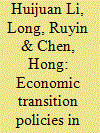

|
|
|
|
|
| Publication |
2013.
|
| Summary/Abstract |
Resource-based cities in China have made momentous contributions to the development of the national economy for decades. However, with the depletion of natural resources, their sustainable development is challenging and transition is important. The Chinese government has made great efforts to help resource-based cities. The purpose of this study is to investigate transition policies and their implementation. Firstly, we reviewed previous studies and summarized the essential elements of some successful resource-based cities, which are useful experiences for Chinese resource-based cities. Secondly, we studied the development of resource-based cities over the past 10 years with a focus on economic development, industrial structure, government revenue and environmental conditions. We found that resource-based cities were less developed compared to other cities. The main reasons are the after-effects of a planned economy, an unreasonable tax system, planning mistakes and misguided resources exploitation policies. Thirdly, we analyzed several aspects of the policy responses after the introduction of transition policies, including designating 69 resource-exhausted cities, supporting cities with funds and projects, formulating transition plans and evaluating transition performance. However, there are some deficiencies in the process of policy implementation. Finally, some recommendations were provided to improve transition performance and sustainable development for resource-based cities.
|
|
|
|
|
|
|
|
|
|
|
|
|
|
|
|
| 5 |
ID:
125762
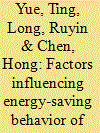

|
|
|
|
|
| Publication |
2013.
|
| Summary/Abstract |
In this research, the willingness of households to adopt different energy-saving behavior has been analyzed, and factors influencing energy-saving behavior in Jiangsu Province, China, have been examined. The study builds on a broad and practical conceptual framework that embraces three types of energy-saving behavior and four dimensions of influencing factors, including socio-demographics, energy-saving awareness, behavioral ability, and situational factors. The empirical results are based on an Internet survey that was sent out to 638 households. The results indicate that socio-demographic characteristics, including age, gender, income level, household structure, and educational background, are all important factors influencing energy-saving behavior. At present, respondents adopt the usage-reduction type of behavior more often than the other two types, which require a greater capacity to pay for energy-efficient products and a higher level of energy-saving awareness. Situational factors have significant positive moderating effects when the variables of behavioral ability and energy-saving awareness act on energy-saving behavior. In addition, the results also show that spatial differences exist among the three regions of Jiangsu Province. Finally, some implications of these results for the design of future incentive policies and measures to encourage energy-saving behavior are presented.
|
|
|
|
|
|
|
|
|
|
|
|
|
|
|
|
| 6 |
ID:
171405
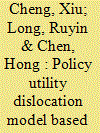

|
|
|
|
|
| Summary/Abstract |
A low-carbon lifestyle is an inevitable choice for mitigating climate change. However, in the actual situation where policy makers and policy target groups are separated from each other, low-carbon lifestyle changes are often manifested as individual strong government actions, behind which social actions are seriously lagging. Based on this observation, in this study a concept of policy utility dislocation was developed, and a policy utility dislocation model was constructed based on prospect theory. Numerical simulation showed that policy utility dislocation can be reduced by increasing the proportion of residents’ environmental benefits, government efforts and subsidies, and reducing the cost of implementing a low-carbon lifestyle for residents. In particular, when the environmental benefits of the government and residents accounted for 15% and 65%, respectively, or the subsidy coefficient was 2, the policy utility dislocation became zero. In addition, policy utility dislocation began to appear when the cost of implementing a low carbon lifestyle exceeded 3. This study enriches the connotation of policy utility and quantifies the policy utility dislocation, and provides new ways to launch policies that promote low-carbon lifestyles.
|
|
|
|
|
|
|
|
|
|
|
|
|
|
|
|
| 7 |
ID:
121343
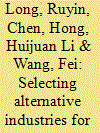

|
|
|
|
|
| Publication |
2013.
|
| Summary/Abstract |
This paper provides a method for choosing alternative industries for resource-based cities that are confronted with resource depletion and have to restructure their industries for future development. The method integrates intra- and inter-regional comparative advantages in a two-dimensional matrix model. We applied this method in an empirical study of Jiaozuo city, China and found that the size of the pool of alternative industries depends on the strictness of the selection criteria.
|
|
|
|
|
|
|
|
|
|
|
|
|
|
|
|
|
|
|
|
|